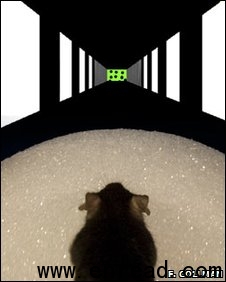| ||||||||||||||||||||||||||||||||||||||||||||||||||||||||||||||||||||||||||||||||||||||||||||||||||||||||
|
With the help of mice scampering1 through a virtual maze2, scientists have taken recordings3 from inside individual brain cells, or neurons. 通过老鼠浏览虚拟迷宫的帮助,科学家得以记录下来单个脑细胞或者说神经元的内部活动。  You could alter an environment as the mouse is walking through it The researchers report in the journal Nature how they recorded from cells in the brain's memory centre. These neurons(神经元) fired in a rhythmic4 pattern that could be related to the animal's location. They hope their technique will help discover how neuronal activity forms new memories and affects behaviour. In the virtual reality system, the mice were able to run around while their heads were kept relatively5 still. This enabled the scientists to measure continuously from one neuron. The team, led by David Tank from Princeton University in New Jersey6, US, took their recordings from "place cells". These are neurons in the brain's hippocampus(海马), which is considered to be the centre of memory formation. Place cells "fire" when an animal is in a particular position within its environment, so neuroscientists hope to fathom7 their role in navigation, learning and memory. Previously8, scientists have studied the cells using extracellular(细胞外的) electrodes - tiny wires placed next to the neurons. "That tells you about their activity, but not about how that activity is generated," explained Professor Tank. He and his colleagues used a technique that allowed them to clamp on to a single neuron and record the activity inside it. Floating in space The scientists took recordings from inside the mouse's brain as it scuttled10(凿沉,奔跑) through the maze. In reality, the mouse remained almost stationary11(不动的) as it walked on the surface of a floating ball suspended on a cushion of air. "This is easy for the mouse to walk and run on - [it's] just like an activity wheel," said Professor Tank. In moving the ball, by walking and running around, the mouse controlled its own movement through the maze. "[It] got treats at each end of the maze," said Professor Tank. "The mouse ran down a corridor(走廊) and when it got to the end it would get a treat. If it wanted another one, it had to turn around and run to the other end." This free movement was crucial(关键的), because the place cells fired, or became active, at certain points along the corridor. The points at which they fire are known as the "place fields". "The bursts of firing [of groups of place cells] have a particular rhythm - like a clock," said Professor Tank. The study revealed that this rhythm changed "in a systematic12 way" as the mouse moved through the place field. "So by looking at this timing13, you can tell where the mouse is," Professor Tank explained. This timing can be thought of a a type of code based on timing that is somehow translated into a memory. Describing the wider significance of the work Professor Tank said: "There is still debate about what place cells are. "Are they a fundamental part of brain circuitry for navigation? Or are they involved in something more general like... the ability to remember a sequence of events." Professor Tank described how the virtual reality system could give neuroscientists the tools they needed to address these questions. "One of the things about virtual reality," he said, "is that you can make manipulations that you can't in the real world. You could alter an environment as the mouse is walking through it [and see how the cells respond]." Dr Rosamund Langston, a neuroscientist from the Norwegian University of Science and Technology in Trondheim described the work as "a huge technical achievement." Dr Langston, whose work is focused on learning and memory, was not involved in this study. She added: "This is an impressive leap forward for neuroscientists at both the cellular9 and systems level." 点击  收听单词发音 收听单词发音
|
||||||||||||||||||||||||||||||||||||||||||||||||||||||||||||||||||||||||||||||||||||||||||||||||||||||||
- 发表评论
-
- 最新评论 进入详细评论页>>



